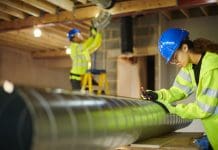David Wigglesworth, managing director at SFS, discusses the current challenges facing the industry and the numerous benefits of digital construction for the built environment
Over the last two decades, industries across the globe have undergone significant change alongside the rise of the digital revolution, with smart appliances and technology now commonplace in day-to-day business processes. However, while some sectors were quick to adopt new processes, the construction industry has been slower to adapt due to the size and complexity of the sector.
The heightened reliance on the construction sector to build more space-efficient buildings at a faster rate will put a higher strain on construction service – which is currently at its highest level since the turn of the century. So, looking ahead, how can the industry begin to prepare for the continued reliance on the sector?
The answer is digital.
The key to keeping up with the expected demand will be the industry’s ability to integrate new digital approaches into standard practice. Digital tools offer a wide variety of benefits, including automation and improved planning processes, saving crucial time and money in a project’s plan of work.
Current digital challenges facing the construction industry
However, to begin introducing digital processes, it’s first important to identify the greatest challenges facing the industry in adopting future technologies.
The most notable and cited barrier to adopting digital technology is the resistance to change within the current construction workforce. In comparison to other industries, the average age is notably higher within construction, at approximately 43 years old.
With little time, resources or grants available from the government, workers that have not recently come out of training or apprenticeships are unable to adopt new technology without sufficient guidance. Attempts to integrate new processes without adequate training can lead to increased errors and accidents due to improper use of the technology, as well as lower work morale and inefficient work rates.
Digital processes must be engrained as a standard across the industry
For companies looking to improve business performance, digital processes must be introduced alongside the recruitment of apprentices and trained into the existing workforce to ensure it is engrained as standard across the industry.
In addition to this, the breakout of the Covid-19 pandemic brought to light the worrying state the construction industry is currently in. Still relying heavily on paper trails and outdated communication, the construction industry was unable to adapt as easily as other sectors.
As companies move towards future-proofing their business processes, automation and digital integration will play a crucial role in ensuring consequent drops in output and profit are not repeated similarly to Covid-19 levels.
What are the benefits of digital construction for the built environment?
The benefits to going digital are wide-ranging and varied, with digital technology capable of assisting businesses in multiple ways, but why should the construction sector be concerned?
Efficiency
In a recent McKinsey report, it was found that over the last 20 years, the construction industry has only grown in productivity by 1%. In comparison to other similar industries, productivity growth rates are almost three times that rate.
Going further, the report found that if productivity rates were to be increased to the same level as similar industries, the construction sector worth £1.16bn more in global revenue – demonstrating the need for the industry to adopt new practices.
The incorporation of digital processes is the first and most viable way to begin addressing the productivity rate within the industry. The utilisation of smart technology means less frequent back and forth during the initial planning stages and on-site work.
Digital designs can also be displayed in real-time and easily adapted to help communicate what is required to the team. Not only does this vastly improve communication, but it can also assist projects with staying on budget.
Sustainability
In the industry, it’s widely known that the built environment is one of the largest contributors to global emissions. According to the US Green Building Council, the construction industry accounts for 40% of the world’s energy usage – a staggering statistic when considering the current pressure on other contributing industries to make significant sustainability changes, such as the automotive industry.
Therefore, by improving production efficiency through new digital processes, fewer emissions are released throughout a build due to the minimised time on site.
The future of digital construction for the built environment
The use of drones in the construction industry can surpass traditional topographic methods of analysis as drones can cover large areas effectively and produce a clear and detailed 3D imagery of the project site. Augmented and virtual reality (AR/VR) is another breakthrough in technology that benefits modern day construction. Like drones, AR/VR can deliver real-time information to a project. This can improve safety and efficiency within construction sites and save time and money.
Another example of this is the expected reliance on robotics.
The skills shortage is a problem at the forefront of multiple industries, including construction. While more recruitment is the short-term solution, integrating higher automation and robotics is the likely solution to help minimise the skills shortage issue, without replacing the dependency on skilled workers.
Robotics will also assist workers with labour-intensive jobs and tasks, allowing for increased efficiency from workers as well as machines. Trials for robotic systems have already begun, with tasks such as bricklaying, steel-truss assembly, welding, painting and concrete laying all varying in success. As the industry progresses, understanding how robotics and automation can benefit building projects will be essential to ensuring the growth of the industry.
Securing Futures in the built environment
As a business SFS is helping to drive digitalisation in the built environment. From intelligent online tools to simple services that streamline migration to digital working, we know our buildings’ future is digital – and so are our businesses. To find out more about how SFS is working to secure the future of digital construction, you can download the Securing Futures playbook.
James Tomlinson
Wyatt International
Tel: +44 (0) 121 454 8181
Vincent Matthews
SFS
Tel: +44 (0)330 0555 888
*Please note: this is a commercial profile













![[VIDEO] Making DorTrak reports easy to read with Fireco Inspecting fire doors at Fireco, firedoor technology, 2023](https://www.pbctoday.co.uk/news/wp-content/uploads/2024/04/JPZ_2364-web-218x150.jpg)
![[VIDEO] Re-flow Field Management review by Traffic Management Installations When TMI began subcontracting for councils and government bodies, they wanted to present their site reporting in a more professional manner](https://www.pbctoday.co.uk/news/wp-content/uploads/2025/03/TMI-Media-1-218x150.png)